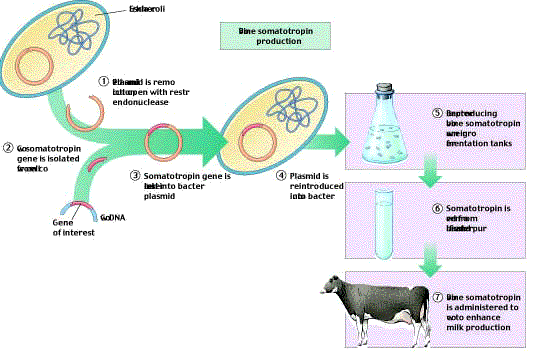
Figure 22
The production of bovine somatotropin (BST) through genetic engineering. Although BST is functional, harmless, and sanctioned by the FDA, much controversy exists over whether it is actually desirable.
representative of the very real promise of genetic engineering to help meet the challenges of the coming new millennium.
The list of gene modifications that directly aid consumers will only grow. In Holland, Dutch bioengineers announced last month that they are genetically engineering plants to act as vaccine-producing factories! To petunias they have added a gene for a vaccine against dog parvovirus, hiding the gene within the petunia genes that direct nectar production. The drug is produced in the nectar, collected by bees, and extracted from the honey. It is hard to believe this isn’t science fiction. Clearly, the real promise of plant genetic engineering lies ahead, and not very far.
Farm Animals
The gene encoding the growth hormone somatotropin was one of the first to be cloned successfully. In 1994 Monsanto received federal approval to make its recombinant bovine somatotropin (BST) commercially available, and dairy farmers worldwide began to add the hormone as a supplement to their cows’ diets, increasing the animals’ milk production (figure 22). Genetically engineered somatotropin is also being tested to see if it increases the muscle weight of cattle and pigs, and as a treatment for human disorders in which the pituitary gland fails to make adequate levels of somatotropin, producing dwarfism. BST ingested in milk or meat has no effect on humans, because it is a protein and is digested in the stomach. Nevertheless, BST has met with some public resistance, due primarily to generalized fears of gene technology. Some people mistrust milk produced through genetic engineering, even though the milk itself is identical to other milk. Problems concerning public perception are not uncommon as gene technology makes an even greater impact on our lives.
Transgenic animals engineered to have specific desirable genes are becoming increasingly available to breeders. Now, instead of selectively breeding for several generations to produce a racehorse or a stud bull with desirable qualities, the process can be shortened by simply engineering such an animal right at the start.
Gene technology is revolutionizing agriculture, increasing yields and resistance to pests, and producing animals with desirable traits.